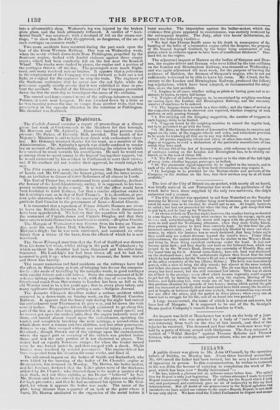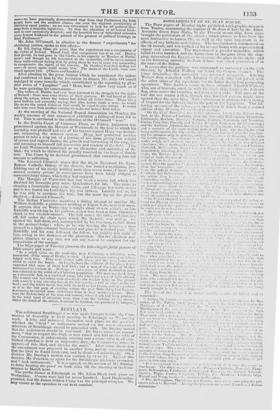IRELAND.
A public dinner was given to Mr. John O'Connell, by the operative tailors of Dublin, on Monday last. About three hundred assembled. Mr. O'Connell the father had been invited, but lie sent a letter instead of nppearing in person. In this communication, he wishes to transmit to his son John the honour of carrying to completion the work of Re- peal, which has been now " finally determined "-
" Ile has, indeed, a glorious but an arduous career before him. The agital I ion fbr Repeal is only just beginning. 'Lime various attempts I made to render Repeal unnecessary—the many threats of calling for the Repeal which I held out, and postponed, and continued, gave an air of insincerity to this illy final determination. But all doubt of our perseverance in the Repeal agitation hag vanished—we have nailed our colours to the mast—Repeal, Repeal, is and shall be our only object. We have tried the United Parliauaent to disgust and imam, ness—we have practically demonstrated that from that Parliament the Irish people have not the smallest chance, nor even the slightest possibibility of obtaining equal justice : we are now determined to look for all political bles- sings front a domestic le isleture. To that the attention of all honest Irish- men is now exclusively directed ; and the heartfelt love of fatherland animates every honest Irishman in the pursuit of the greatest of political blessings, an Irish Parliament."
Mr. John O'Connell, in allusion to the former " experiments" for obtaining justice, spoke to this effect— Ile felt, during those six years, that the experiment was a compromise of the rights of Ireland. Thank. God, that compromise was at an end. During that period, he bad gone to the Castle, in his capacity as Member of Parlia- ment; and though he felt honoured at the invitation, still he never entered those walls without feeling that by going there he was in some way consenting to compromise the rights of his country. Ile thanked God that feeling was over—it never again could annoy him. The doors of the Castle were now closed against him. (Cheers and laughter.) After alluding to the great honour which he considered the tailors had conferred on him by the invitation to dinner, Mr. John O'Connell indulged in some remarks which, embellished in the reporting by plen- tiful notes of "Laughter" and " hear, hear !" show very much as if he were quizzing his entertainers— The tailors of Dublin had ever been foremost in the struggle fur the rights of Ireland : there were even stories of their prowess. Ile had heard of tights along the quays, where the tailors had licked all before them. There was a most buffoon and unworthy saying, that nine tailors made a tnan : he would like to see the moral Colossus that would be equal to nine tai!ors. It would take time men front another country to make one honest Irish tailor.
At the meeting of the National Repeal Association on Monday, the weekly amount of rent announced exhibited a Ming-off from 90/. to 70/. This is attributed to the collection of the O'Connell " rent."
In the Dublin Court of Common Pleas, on Friday, judgment was pronounced against the Marquis of Westmeath in the case in which his Lordship was plaintiff and one of' his tenants named Hogg was defend- ant, respecting the connere system. Hogg had permitted another person to take a crop out of a portion of his farm, giving him a right of access and regress during the growth and harvesting of the crop, but
still retaining to himself full possession and mastery of the field. This act Lord Westmeath construed as an alienation and subletting of the
land ; for which he claimed the penalty reserved in his lease of double rent. The Court by its decision pronounced that conaereing does not amount to subletting.
The Limerick Chronicle states that the Right Reverend Dr. Ryan, Roman Catholic Bishop of the diocese, has issued a regulation, pro- hibiting any of his clergy holding more thau seven acres of land ; and several country priests in consequence have been lately obliged to surrender large farms, which they had enjoyed. The Marquis of Waterford had last week a severe fall, which has disabled his favourite gray mare, Quicksilver, for life. The mare, in clearing a formidable leap, Cattle down, and fell upon her noble rider : and it was feared his Lordship's leg was broken. Luckily not so, for he was able to continue the rein; but the mare lay on the ground disabled.—Limerick Chronicle.
The I3elfast Vindicator mentions a daring attempt to murder Mr. William Radcliffe, a gentleman residing at Logan Vale, near tl.at town. It appears that on Wednesday sennight about eleven o'clock, as Mr. Radcliffe was sitting in his parlour, a shot was fired at him, thronell chink in the window-shutter. The ball struck Iii tablo, and glanein; off, fell uuder the chair upon which Mr. liadelitre was sit uieg. lie opened the hall-door, and, accompanied by Ins two sons, rushed down to the porters'-lodge ; when, as he was rousing the hone!: a men dressed in a light-coloured frock-coat and glazed cap dashed 1..ts!. Mr. Radcliffe and his SODS followed the fellow, but quickly list si:411t, hint, owing to the darkness of the plantation. Not the sliehteat sus- picion attaches to any one, nor can any reason be assigned tem the commission of the outrage.
Tiw Sligo paper of Tuesday presents the following frightful picture of Irish misery and want- " In a small cabin on the road,ide, near Coliooney, a labouring man, unmarried. of the DIEM of Ileally, resided. A poor woman, musing an infant-, lodged with him. They were visited with fee, r, atidt la atighltours were afraid to enter the house. At ler;111, front the stilhiets of the phice, it wit; suspected that some of them had died ; and a man of the name of Moffatt determined to venture in. I'echiapco sad a :Tone of utter destitution never was witnesed in the midst of a Christ hut population. The man was dead, lvint; on a miserable bed, in a wretched room. into which not it ny of it entered. The woman situ her infant were also dead ; the mother lying on the grount, with scarcely a rag coveting her, at the kitchen-tire, a tuft td. straw under her head ; and the infant beside her, with its bead on Ler hrash, and in a pisit ion as it' in the last gasp of expia-ing nature the IHRIr little thing had Leen en- caroming to extract SOW SlIstenanee from its dead mother s breast. I here were the lifeless body of the tnan and woman, whose death had b.•eit produced by the total want of attention more than fi om the violence of in disease whilst the death of the infant, it cannot be doubted, was produced by hunger.':



























 Previous page
Previous page